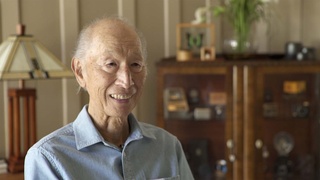Interviews
Resisting transfer from Jerome
When I, the next day, the battalion commander came in, maybe he heard that I was there or something. The troops didn’t come in, but he came in. And I reported to him and no sooner did I report, then he said, well he says,” I’ll have you transferred immediately.” And I was sort of shocked, I said,” but I just got here, I’m just reporting, why are you transferring me?” He says,” well you’re Korean and these men are all Japanese Americans.” And he says,” Historically, Koreans and Japanese don’t get along.” He says,” I know that from being up on the islands.” He said,” and that’s the reason why.” And I responded,” but they’re Americans and I’m American, we’re all fighting for the same reason, I don’t see why I can’t stay.”
Date: August 28, 1995
Location: California, US
Contributed by: Watase Media Arts Center, Japanese American National Museum






